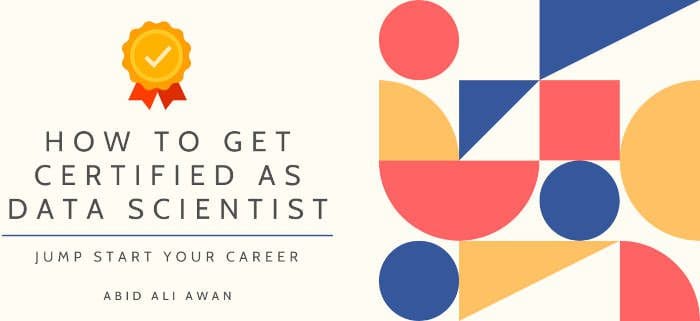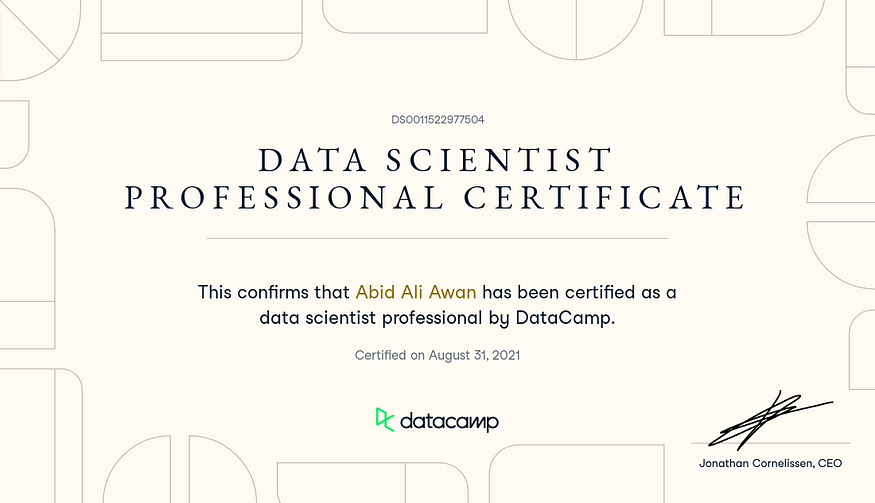 How to Get Certified as a Data Scientist
How to Get Certified as a Data Scientist
If you are early in your journey to becoming a Data Scientist, an interesting option is to earn certification by DataCamp, and this guide offers tips that will help beginners complete the challenges.

Image by Author.
The world of data science is still new as compared to other software-related fields, and it doesn’t have a gold standard on what skills you need to acquire to be called a professional data scientist. This is where DataCamp certification comes in to access your knowledge and skills. Just like in the world of computer networks, the Cisco certification is a gold standard. Similarly, DataCamp is accessing an individual’s skills by conducting various challenges.
During the Certificate Challenge, I was a professional data scientist working with various companies on various projects. Initially, I thought it was a piece of cake for me, but in reality, it was challenging, and I had to give my 100 percent to clear all the stages. The certification challenges are designed to filter out 90 percent of candidates and award only a few individuals with specialized skills. In this guide, we are going to learn each step in detail, and I will give you tips and tricks to pass all the stages.
After clearing all the stages, you will receive a certificate, as shown below, and it’s all worth it.

Abid Ali Awan’s Data Scientist Professional certificate
Completing Data Science Courses
First of all, you need to learn all the skills before signing up for certification. You need to either learn Python (the most used language) or R (the language of statisticians).
You will also learn:
- Data Management: Data Ingestion, Manipulation, Augmentation, and dealing with missing values.
- Exploratory Analysis: Feature engineering, data analysis, visualization, and Data Insights.
- Statistical Experimentation: Performing various statistical approaches to solve a similar problem.
- Machine Learning: Predictive models, machine learning workflow, optimizing model, and experimenting.
- Coding for Production Environments: Reusable code, unit testing, modularization, and adopting industry standards.
- Communication and Reporting: Presenting data in reports or dashboards and delivering key information to both technical and non-technical stakeholders.
You can learn all these skills for free on YouTube, but I highly recommend you check out paid courses.

Image by Author | Elements by freepik.
I have experience with Coursera, DataCamp, Udacity, and Codecademy, so I can only suggest these courses, but you can always look for better online courses.
- Data Science | Coursera
- Career tracks — DataCamp Learn
- Learn to Become a Data Scientist Online (udacity.com)
- Data Scientist | Codecademy
Timed assessments
After you have successfully completed the Data Science skill track, head to the DataCamp Certification section and start taking timed assessments tests. There are three timed assessments tests, and you will have 15 questions for each test. Each question has a time limit, which can vary depending on the complexity of the problem statement, so please do not look for the answers on the internet as you will lose the time, and it will count as zero.
These questions will test your skill on:
- Coding for Production
- Statistical Experimentation
- Exploratory Analysis with PostgreSQL
You can retake the test if you fail, and sometimes, even if you have passed, you must achieve a higher score in order to advance into the next stage, which can be the 90th percentile in some cases. To successfully pass this stage, you need to be on your A-game.
Tip: If you got a bad score, go back and check all the wrong answers. If it was a silly mistake, then try to write it down on paper, but if you have no idea about the question, then I will suggest you watch a video tutorial on that specific problem. These questions won’t repeat, and you might make the same mistake again.
Coding challenge
In this coding challenge, there is no time limit, and you have complete freedom to come up with a solution to a given problem. The goal is to test the coding skills of individuals and their ability to solve data problems. In my case, I had to clean the data, add additional features, and finally use statistical tools to come up with a solution. This challenge can be solved within 30 minutes but if you are stuck and unable to get the correct result. It might take more than 30 minutes.
Tips:
- Always read the problem statement twice and try to give yourself time before you start coding.
- Plan things out before writing a single line of code.
- Don’t overthink. Just attempt the problem as simply as you can because there are no trick questions.
- If you are stuck, take a break, go out have a coffee, even during your test.
- It’s OK not to get an answer on the first try because that doesn’t mean you are not good enough.
You can read my blog on the coding challenge here and learn more about my experience.
Case study
In the final stage, you have to book the date using the DataCamp portal for the 24-hour test. After that, you will get details about the case study and how this case study will be marked by experts. You will get an email 24 hours before the presentation date, and you have the whole day to prepare: a technical report and a non-technical presentation. This is simple and straightforward, but you need to perform all the required tasks such as:
- Data Cleaning
- Data Analysis/visualization
- Machine learning model
- Experiments
- Reporting
- Results
- Non-technical presentation
Technical report
The technical report is usually based in Jupyter notebook, and DataCamp will provide a workspace for you to run your experiments and develop the technical report.
To successfully pass this stage:
- You need to practice data analytics and machine learning portfolio projects.
- You need to be comfortable with markdown and python code.
- You need to have full command of various visualization and machine learning tools.
- Finally, you need to have experience in writing a technical report.
Tip: Try to keep things simple and explain every part in the Jupiter notebook by using markdown cells. Add a few images and a back story about the problems statement. Try to experiment with all machine learning algorithms and focus more on explaining results.
The majority of candidates fail in this stage, and then they have to wait for 4 weeks before they can apply again.
Non-technical presentation
For this section, you need to create a presentation with MS PowerPoint or any software you are comfortable with. Remember you need to prepare this presentation for a non-technical audience, so no more statistical equations or machine learning results. This is a Zoom presentation with an expert who will mark you on various attributes. Points will be deducted if you take more than 12 minutes to cover all the topics. Try to copy-paste visualization and add less text. Stick to the results and practice storytelling.
Tip: Time your presentation and keep it short. Don’t add too much text. Try to explain the case study in your words. Stick to the key findings and results. Give the stakeholder business solution based on your findings. Be confident and speak clearly.
Career Services
After the presentation, you will get an email about your results within four working days. If you have successfully cleared all the stages, you will get multiple emails about your certificate link and personalized career service.
The Career Service Includes:
- Personalized career counseling session
- Resume feedback
- Mock interview on Skilled
- Gain access to Huntr
- Job matching
It’s all worth it as the career service will help you elevate in your field and match you with top companies. I will highly recommend candidates to complete certification and take full advantage of personalized career services.
Conclusion
In this blog, we covered all the parts required for you to get certified. First, you need to gain the required skill either by practicing on projects or completing the data science skill path. Then, start with a timed assessment on DataCamp. After that, move to code challenge and case study. It’s that simple, but not everyone is getting certified because candidates are making mistakes of jumping throughout the course. You need to gain enough experience and skills to get certified by DataCamp. So start working on the tips I have shared and jump-start your career as Data Scientist.

Image by Author | Elements by freepik.
Related:

 How to Get Certified as a Data Scientist
How to Get Certified as a Data Scientist